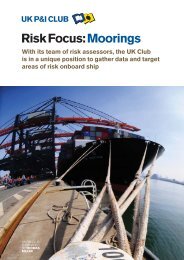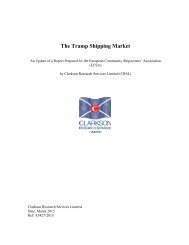Preparing cargo holds_ Loading solid bulk cargoes
Preparing cargo holds_ Loading solid bulk cargoes
Preparing cargo holds_ Loading solid bulk cargoes
Create successful ePaper yourself
Turn your PDF publications into a flip-book with our unique Google optimized e-Paper software.
´ ´ No discharge of <strong>cargo</strong> residues should occur less than 12 nautical miles from the nearest land, or the<br />
nearest ice shelf.<br />
´ ´ No discharge of <strong>cargo</strong> residues should occur within the six MARPOL defined ‘Special Areas’.<br />
´ ´ No discharge of any <strong>cargo</strong> residues specified as HME.<br />
´ ´ Hold wash water should be discharged to a suitable reception facility (RF).<br />
Note: due to a reported lack of adequate reception facilities at present, MEPC Circular 8104 allows the<br />
discharge of HME <strong>cargo</strong> residues contained in hold wash water until 31 December 2015 outside Special Areas<br />
providing that;<br />
- Based on the information from the relevant port authorities, the master determines that there are no<br />
adequate RFs at the receiving terminal or at the next port of call.<br />
- The ship is en-route and as far as practicable (but at least 12 nautical miles) from the nearest land.<br />
- Before washing <strong>solid</strong> <strong>bulk</strong> <strong>cargo</strong>es are removed (and bagged for discharge ashore) as far as practicable<br />
(and the <strong>holds</strong> swept).<br />
- Filters are used in the bilge wells to collect any remaining <strong>solid</strong> particles<br />
- The discharge is recorded in the garbage record book with the flag state notified utilising the revised<br />
con<strong>solid</strong>ated format for reporting alleged inadequacies of port reception facilities stated in MEPC.1/<br />
Circ.469/Rev.2.<br />
- It is still a requirement for receiving terminals to provide adequate port reception facilities for this<br />
waste stream, the circular only provides flexibility for ship owners and operators in the case when<br />
receiving terminals have failed to meet their obligations under the Annex.<br />
Skuld Case Study:<br />
In a string of Charterers, Skuld<br />
Charterer Member had the contractual<br />
responsibility to prepare the vessel for<br />
the last <strong>cargo</strong> (Sulphur). The Owners<br />
alleged that multi-million dollar damage<br />
was caused to the <strong>holds</strong> of the vessel<br />
due to alleged insufficient lime washing.<br />
Skuld was able to negotiate a drop out for<br />
Skuld’s Member and the case continued<br />
directly between Owners and sub-<br />
Charterers. This was due to Skuld being<br />
able to obtain full security against sub-<br />
Charterers early on. The case highlights<br />
the need to ensure that (a) when<br />
chemically reactive <strong>cargo</strong>es are laden<br />
that <strong>holds</strong> are fully prepared for the job<br />
and that (b) contractual counterparties<br />
are able to meet significant liabilities<br />
when they arise.<br />
All traces of cleaning chemicals must be thoroughly removed<br />
PAGE 9




